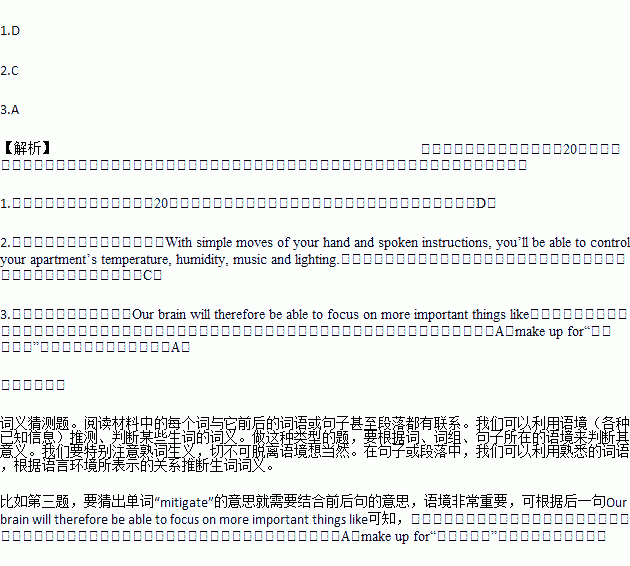题目内容
It’s an ordinary morning,like all the others.But instead of being woken up by the buzzing of an alarm clock, you’ll be roused by the smell of freshly made coffee,light entering your room as the curtains open automatically,and a gentle back massage(按摩)provided by your high-tech bed.
This is what a typical(典型的) person's life will be like two decades from now,according to The Guardian. Want to know more?
After you get up, your apartment will be like an electronic orchestra with you as the conductor. With simple moves of your hand and spoken instructions, you’ll be able to control your apartment’s temperature, humidity, music and lighting. You’ll be able to look through the day’s news on translucent screens while your breakfast waits for you in the automatic oven.
As you move into your kitchen, you might accidentally hit your toe on a cupboard. If you do, you’ll grab your cell phone and open the diagnostics(诊断) app. Inside your phone there will be a tiny microchip(芯片) that uses X-ray waves to scan your body. The scan will tell whether your toe is bruised or broken.
After breakfast, your driverless car will take you to work. While you “drive”, your central computer system will suggest a list of chores(家务事) that your housekeeping robots can do that day and it will also remind you to buy a gift for your mother’s upcoming birthday.
As you can see, with the help of advanced technology, our lives will be more efficient(有效率的). Technology will mitigate our forgetfulness and free us of many small burdens that distract us, such as buying a ticket. Our brain will therefore be able to focus on more important things like preparing for a presentation or doing “deep thinking”.
However, the development of technology might have some disadvantages as well. By 2036, we’ll be relying heavily on the virtual(虚拟的) world, which will mean that all of our data will be stored in the cloud, a remote digital storage system with near limitless capacity(容量). That will increase the possibility of someone else accessing, sharing or manipulating(操控) our personal information.
1.What might be the author’s purpose in writing the text?
A. To stress the importance of developing technology.
B. To remind people not to depend too much on computers.
C. To introduce one new invention that will benefit our future lives.
D. To describe how advanced technologies will affect our future lives.
2.According to the text, in two decades, ________.
A. you’ll be able to rely on an electronic orchestra to wake you up instead of an alarm clock
B. a tiny microchip in your phone will treat you when you are sick
C. you will be able to adjust the conditions of your apartment via oral instructions or simple hand gestures
D. technology will be smart enough to help us with important things like preparing for a presentation
3.What does the underlined word “mitigate” in Paragraph 6 mean?
A. Make up for. B. Worsen. C. Cure. D. Take advantage of.

